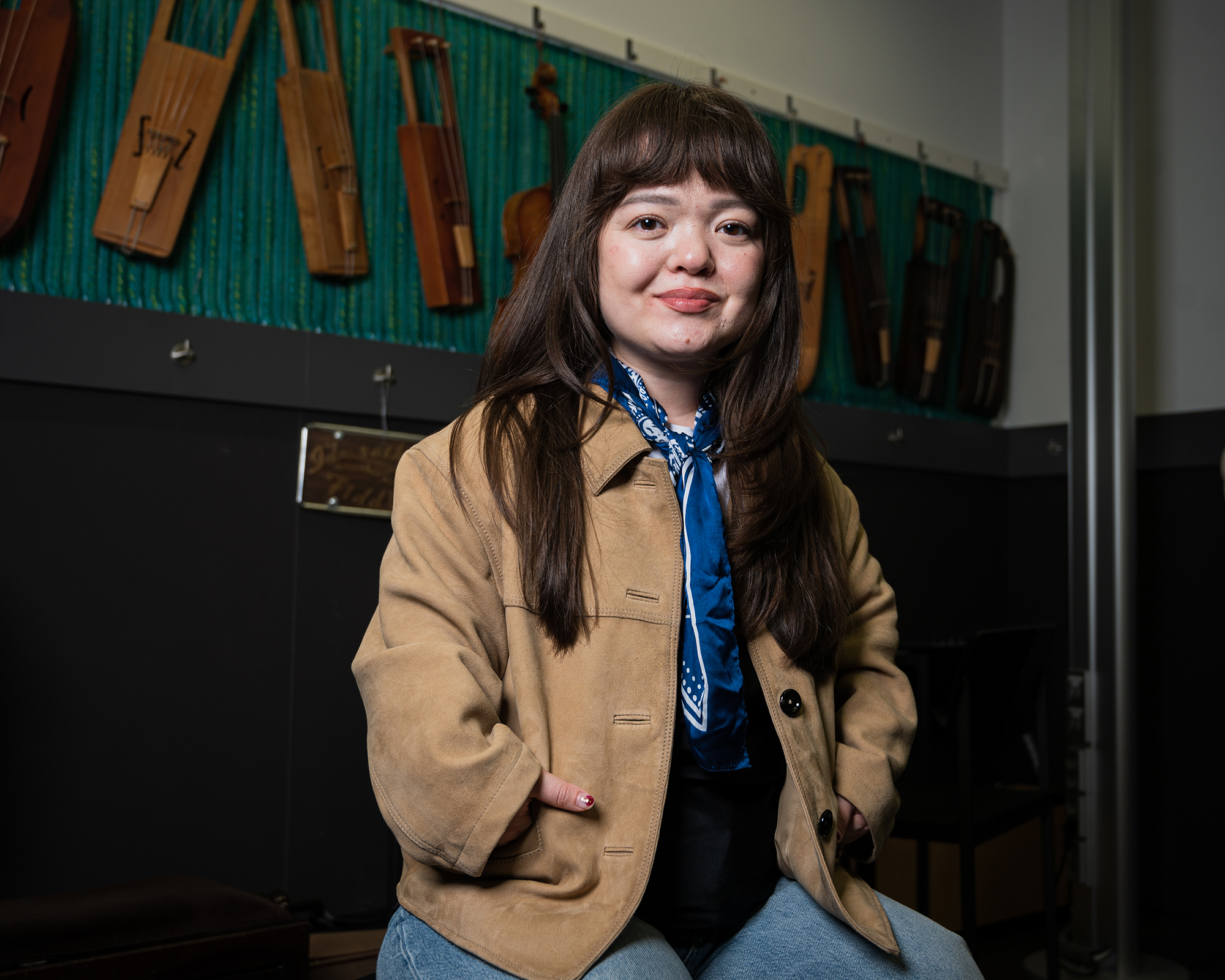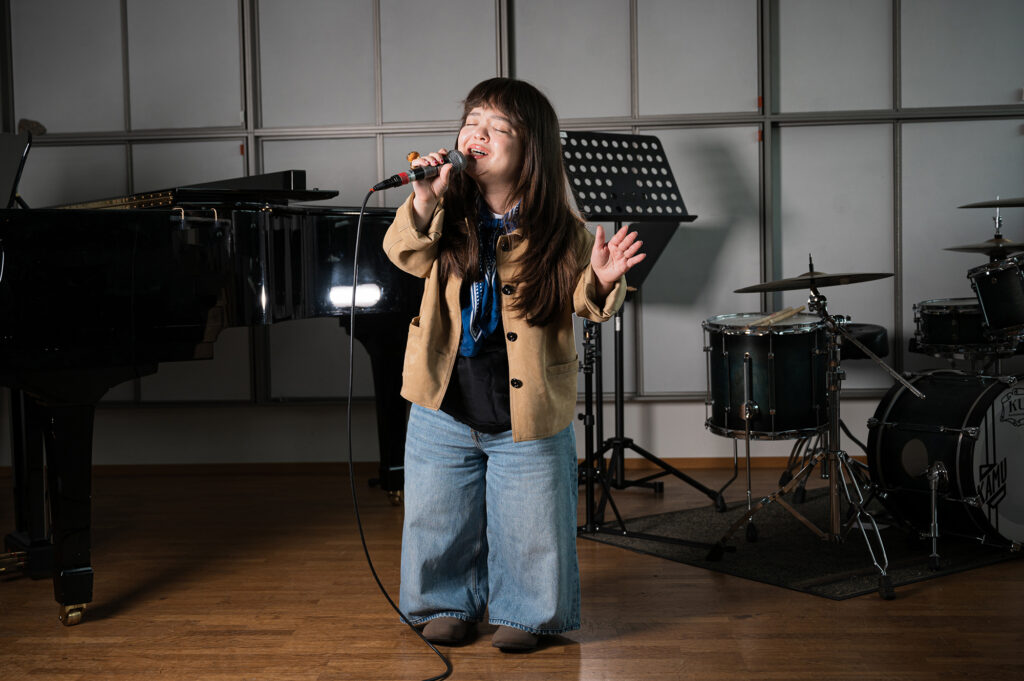A sting of realization flipped a Kazakh musician’s world upside down: “My art was about pleasing others”

Decolonization is a topic rarely studied in Central Asia. Through her doctoral research, Aizhan aims to encourage more discussion on the subject.
Flor Salazar Martinez
Sercan Alkan
Published 01.07.2025 at 8:15
Updated 19.06.2025 at 6:49
In January 2022, Aizhan Sultan found herself looking at her passport. It had Kazakh written on it as her nationality. But what, she was wondering, was actually Kazakh in her?
Somehow even the name felt wrong. On the passport, her surname was spelled with the gendered ending, Sultanova. That is not the traditional way in Kazakhstan, rather a remnant of the Soviet-era colonization.
“In Kazakh, my name should just mean ‘the daughter of my father’. It’s not supposed to be Russified.”
At the time, Kazakhstan was going through “Bloody January”, a nationwide eruption against economic inequality and government corruption. This uprising also showed the Russian influence that had continued despite Kazakhstan’s independence after the collapse of the Soviet Union.
For Sultan, the moment was pivotal. She is a trained singer and musician from the Northern part of Kazakhstan. There the Russian influence is the strongest.
Sultan is fluent both in Kazakh and Russian, but up to that point Kazakh language had not much space in her art as she had been using mostly Russian.
Now it started to feel wrong. As if parts of her music and even her persona were imposed on her from the outside.
“I grew up with privileges because my white-passing”, she says, meaning that she resembles the ideals of how a Russian should look. “I speak the language perfectly and performed classical music. I realised my art was about pleasing others.”
“I felt like I had no future”
Although the Bloody January events had a strong impact on Sultan, she was observing them from a distance. She left Kazakhstan in 2018 and ended up in Lithuania, where she studied for a master’s degree in music performance at Vytautas Magnus University in Kaunas. After graduation in 2020 she worked as a professor’s assistant there for another year.
Life in Lithuania had started to feel suffocating. The salaries were low and career prospects in a small country limited. Sultan also experienced racism towards her.
“I felt like I had no future there”, she recalls.
In November 2020 she did a short trip in Helsinki. She had never visited the city, let alone thought of living there. Still, something in the place clicked.
Encouraged by a couple of friends, she quit her job and moved to Finland, even though her initial plan included only determination and a working visa.
“I don’t know what happened to me, because I’m usually the person who thinks carefully before.”
In January 2022, Sultan had been living in Helsinki for little more than a year. She worked as music teacher and performed in several gigs with the collaboration of renowned Finnish singer Catharina Zühlke.
Research combining two personal experiences
The sting of realization caused by the events of Bloody January led her to reassess the identity she had built for herself and motivated her to change.
The first step was observing Kazakh folk music traditions, a genre often dismissed in Kazakhstan music conservatories as “unskilled” or “worthless.” She also started to practice the art of throat singing.
She applied and was accepted to Sibelius Academy; first in a one-year preparatory programme, and then, in June 2024 to a doctoral programme. Combining her art with research offered her the possibility to explore her Kazakhs roots further.
In her PhD research, entitled Breaking the silence of the steppes: decolonization process and its consequences on artistic identity, Sultan is going to reflect on the effects of colonization on artistic identity.

Another important aspect of her work is her experience of disability.
Aizhan was born with achondroplasia, a form of dwarfism caused by a genetic mutation affecting bone growth.
Although her family always treated her no differently, she had felt the silent weight of social expectations and discomfort her whole life.
“At school, my teacher once said, ‘She’s too confident,’ like that was a problem.”
The attitudes of the public have also affected her musical career. Especially appearances in popular reality shows such as The X Factor and The Voice of Ukraine have led to intensive public scrutiny of her body.
“People called me names, compared me to Thumbelina. All the emphasis was on my looks, not on my talent.”
Nowadays, she feels that her whole life she was hiding in long dresses and high heels.
The realization was so strong that she wanted to explore her experience deeper.
Decolonization is a personal journey
Sultan’s doctoral research is scheduled to be defended at the end of 2028. It will be an autoethnographic journey expected to result in a short album recording, a series of concerts and a research paper. She says it will be “challenging, hurtful, emotional but rewarding”, but at such an early stage she has not drafted any conclusion.
“I’m still at the beginning. My first concert will be in November, in collaboration with a Kazakh musician Zhantu Dadabayev.”
There are only a few Kazakh artists dealing with decolonization in their music in the field of research. As far as she knows, she might be the first one doing artistic research in this topic in Europe.
Sultan hopes that her research will not only serve science but also works as a lifeline. And not only for herself.
“If someone in the future decides they want to start their own decolonization journey, I hope my work gives them a recipe.”
To dive into two deeply personal and complex experiences at the same time, one needs a stable platform. Neutral ground, as Sultan puts it. For her, Finland has become one.
“Here there is space for conversation. For the first time, I had time and space to think about who I wanted to be.”
She doesn’t romanticize Finnish inclusivity as she recognises that there is still a lot of work to do. But still: “being different here is not so tragic.”